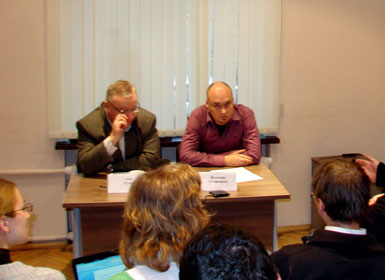Precinct election commissions: ‘discrimination coefficient’ remains the same
On 5
November the civil campaign Human Rights
Defenders for Free Elections held a press-conference on the results of the
formation of precinct election commissions. The results that were announced by
the Chairperson of the Belarusian Helsinki Committee Aleh Hulak and the lawyer
of the Human Rights Center Viasna Valiantsin
Stefanovich are quite disappointing for those who expect some democratization
of the election process. It was stated that representatives of opposition
structures weren’t included in the commissions five times more often than
representatives of the organizations that are loyal to the present authorities.
‘The coefficient of discrimination’, as Mr. Hulak called it, remains the same
in comparison to the previous election.
The observers don’t deny that some improvements took place, but conclude that
many of them remain in paper. They pointed that ‘some positive novelties in the
electoral legislation in January 2010 didn’t change the essence of the process
of the formation of the PECs:
a total control from the side of the executive committees who are a part of the
power vertical of the incumbent’. By positive changes they mean the restriction
of the number of the state officials in the commissions, the guarantees of
inclusion at least one third of representatives of political parties and NGOs
and the possibility of appealing against the results of the formation of the
commissions at court. Formally, such possibilities and proportions, but in
practice everything is quite different.
As stated by Valiantsin Stefanovich, NGOs are represented at PECs by mainly five organizations: Belaya Rus, the Federation of Trade
Unions of Belarus, the Belarusian Union of Women, the Belarusian Republican
Youth Union and the Belarusian Public Association of Veterans. ‘Together they
nominated 84.8% of candidates for the PECs
from NGOs and trade unions’, stated the Viasna
lawyer. ‘Thus, just 15.2% is left for all other public associations of the
country. It means that these organizations act as the main organizers of the
election,’ summed up the human rights defender. According to him, a similar
tendency could be observed during the formation of the territorial election
commissions.
The statistics concerning the inclusion of representatives of opposition
parties look a little bit better: 17% (and 15% - during the formation of the
territorial commissions). However, this slight improvement will hardly influence
the general situation: only 0.25% of representatives of opposition parties will
work in 3% of PECs throughout Belarus.
The human rights defenders point that during the formation of the PECs priority
was evidently given to pro-governmental parties (87.7% of their nominees were
included in the commissions), the four aforementioned pro-regime NGOs and the
Federation of Trade Unions (a total of 93.2% of all candidacies for the commissions
was nominated by all of them. By the way, sometimes 100% of the nominees of such
NGOs as Belaya Rus and the Belarusian
Union of Women were included in the PECs of the Minsk region.
As stated by Aleh Hulak, in Minsk
the authorities usually explained the non-inclusion of oppositionists in the
commissions by saying that they usually noticed defects and composed complaints
instead of reaching agreements with other members of the commissions.
The PECs were often formed in the absence of observers, though in many cases
the local authorities demonstrated a positive attitude to them and even invited
them to their sittings. However, in some places (such as Babruisk) the
situation was quite different – the observers weren’t admitted to the sittings
at which the precinct commissions were formed and were told that their presence
was unauthorized.
According to Mr. Hulak, the presence of observers at the sittings of the state
organs is not provided by the electoral legislation. However, if observers aren’t
allowed to monitor this stage of elections it presents a threat to the
principle of transparency of elections. Most probably, the reason for the
secretiveness of the authorities is that often members of the executive
committees voted for all lists of members of executive committees at once,
without discussing the candidacies. According to the facts that had been
registered by the campaign observers and were voiced by Mr. Hulak, in some
cases the lists of commissions including several thousand of members were
adopted for 20 minutes.
Now the human rights defenders monitor the process of appealing. ‘Only our lawyers
composed 77 complaints against the non-inclusion of people in the PECs’, said Aleh Hulak,
and added that ‘all attempts to appeal the actions of the executive committees
have been fruitless so far’. Nevertheless, he states that it is necessary to
use all legal mechanisms, which will let either protect the legal rights and
interests of citizens or provide documentary evidence of non-transparent
conduct of the election. ‘Thus, this stage of the electoral campaign became a precautionary
shower after the liberal stage of the collection of signatures,’ summed up the
BHC Chairperson.
Human Rights Defenders for Free Elections


















